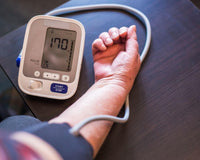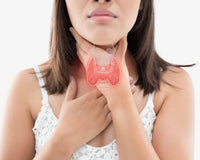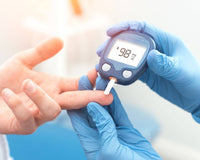Symptoms Of Hypothyroidism
Hypothyroidism (under active thyroid) is a condition where your thyroid gland doesn’t produce enough crucial hormones. If left untreated, hypothyroidism may cause a number of health problems like infertility and obesity. In this article we discuss and answer the question, “what is hypothyroidism?”
About Hypothyroidism
Hypothyroidism occurs when your body doesn’t produce enough essential thyroid hormones. The thyroid is a small, butterfly-shaped gland that sits at the front of your neck and releases hormones to help your body regulate and use energy.
The thryoid responsible for providing energy to (nearly) every organ in your body. It also controls how your heart beats and how well your digestive system works. Without a properly functioning thyroid, your body’s functions begin to become impaired.
Symptoms Of Hypothyroidism
From feeling tired to hair loss to itchy and dry skin there are quite a few distinct signs and symptoms of hypothyroidism.
1. Feeling Tired
One of the most commonly reported symptoms of hypothyroidism is feeling drained. This is because thyroid hormones control energy balance and influence whether you feel ready to go or ready to take a nap.
For example, one study that included 138 adults with hypothyroidism found that each participant experienced both physical exhaustion and reduced activity on a regular basis. Another study found that 50% people with hypothyroidism felt constantly tired, while 42% of people with lower than normal thyroid levels slept more than they used to.
2. Unexpected Weight Gain
Another common and unfortunate symptom of hypothyroidism is unexpected weight gain. When your thyroid levels are low, your metabolism can be altered. Instead of burning calories your basal metabolic rate decreases. Consequently, your body stores more calories as fat which can, even if the number of calories eaten per day remains constant, lead to weight gain.
One study found that people recently diagnosed with hypothyroidism gained an average of 15-30 pounds since their diagnoses (one year later).
If you feel as if you’ve been gaining weight lately, first consider if that can be attributed to lifestyle changes before jumping to conclusions. If you seem to be adding on a few pounds here and there despite a good diet and exercise plan, speak with your doctor. It may be a sign that something else is going on.
3. Hair Loss
Amazingly enough, like most cells in your body, hair follicles are regulated by thyroid hormones. In fact, low thyroid hormones cause hair follicles to stop regenerating which can result in hair loss.
One study found that over 25% of patients seeing a specialist for hair loss also had low levels of thyroid hormone.
Because hair follicles have stem cells which have a shorter lifespan, they are much more sensitive to low thyroid levels than other tissues in the body.
4. Feeling Cold
Think about how hot you were after you completed your last workout. This is because you burned calories and heat is a byproduct of burning calories.
Even as you read this, you’re burning a small amount of calories. In the case of hypothyroidism, however, your metabolic rate decreases, reducing the amount of calories you burn and heat you generate.
About 40% of low-thyroid individuals feel more sensitive to cold than usual.
5. Dry and Itchy Skin
Similar to hair follicles, skin cells are also characterized by rapid turnover and are sensitive to low thyroid-hormone levels.
For example, one study found that 74% of individuals suffering from hypothyroidism reported dry and itchy skin. Furthermore, 50% of the study’s participants reported that their skin had gotten worse over the past year.
6. Muscle Aches and Joint Pain
Low thyroid hormone levels can flip the metabolic switch toward catabolism. This is when the body breaks down tissues like muscle to use for energy. During this process, muscle strength deteriorates and may lead to feelings of weakness and painful aches.
Compared to healthy people, low-thyroid individuals are twice as likely to feel weaker than usual. Additionally, nearly one-third of individuals suffering from hypothyroidism get muscle cramps in the absence of recent activity.
7. Depression
Although the reasons behind this are unclear, hypothyroidism is linked to depression. Research suggests that it may be partially because of an overall decrease in energy and health.
A recent study found that 64% of women and 57% of men with hypothyroidism reported feelings of depression and intense feelings of anxiety. Another subsequent study found similar results and also found that these feelings were connected to decreased satisfaction with their sex lives.
Feeling depressed is a good reason to talk to someone or take an online mental health test. Whether it be thyroid-related or not, if you are feeling down talk to someone you trust. They may be able to help.
8. Constipation
Low thyroid levels put a stop to colon activity. In fact, studies suggests that constipation affects nearly 17% of people with low thyroid hormone. The reason, is, in part, because when you have low thyroid hormone, your bodily processes slow down and this includes your digestion.
A 2019 study found that 20% of people with hypothyroidism said their constipation was getting worse, compared to only 6% of individuals with normal thyroid levels.
If your constipation gets worse and you have tried common laxatives without success, seek medical advice right away.
9. Intense Periods
Intense and irregular menstrual bleeding is linked to hypothyroidism.
One study found that nearly 40% of women with low thyroid hormone experienced heavy bleeding and menstrual irregularity compared to only 26% of women with normal thyroid levels.
Thyroid hormones interact with other hormones in the body that regulate the menstrual cycle and also directly affect the ovaries and uterus.
10. Difficulty Focusing or Concentrating
Difficulty focusing has been commonly reported in many patients with hypothyroidism. One recent, controlled study found that 22% of low-thyroid individuals experience daily difficulty doing elementary-level math. 36% also described thinking more slowly and having a poorer memory.
The exact cause is not yet fully understood, however, difficulties in memory seem to improve with treatment of low thyroid hormone.
Symptoms of Hypothyroidism Summary
Hypothyroidism, or low thyroid, is a common disorder that can cause a variety of symptoms including:
- Fatigue
- Weight gain
- Itchy and dry skin
- Poor mental acuity
- Heavy menstrual bleeding in females
Luckily, hypothyroidism is generally treatable with inexpensive medications such as levothyroxine which is available on Manifest Pharmacy with free home delivery.








